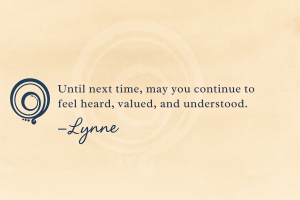Dear Therapist,
Why do I always feel like I’m not enough? I push myself so hard, try to be perfect in every role at work, at home, in relationships, yet I still feel like I’m falling short. How do I break out of this cycle of never feeling good enough?
-Anonymous
Dear Anonymous,
Feeling like you’re “never enough” is one of the most exhausting emotional loops a person can live in. You can give, achieve, show up, and keep pushing, yet still end most days with the sense that you’ve fallen short. It’s not that you aren’t doing enough. It’s that your inner measuring stick has been shaped by something deeper than your current efforts. In these scenarios, I find clients are setting unrealistic expectations for themselves yet for others the bar is lower.
Why is that? Well, for many people, this belief didn’t begin in adulthood. It often comes from environments where love, attention, or safety felt conditional. Maybe you had to be helpful, responsible, quiet, successful, or “easy” to be treated positively. Over time, your nervous system learned to link worth with performance. So even now, when you’re doing everything “right,” your body and mind still operate from an old message: “I only deserve care if I earn it” or “love has to be earned.”
Perfectionism often grows out of this message, not as a personality trait, but as a coping strategy. On the surface, high achievers look responsible, organized, and reliable. But underneath, many are driven by fear: fear of disappointing someone, fear of rejection or criticism, fear of being seen as inadequate. Perfectionism becomes emotional armor protective, but heavy. And it’s impossible to feel “good enough” when you’re constantly bracing yourself for the next way you might fall short.
Even when you do accomplish something, the sense of relief fades quickly. That’s because you’re not asking, “Am I proud of myself?” You’re asking, “Is this enough to keep others pleased with me?” When the goal is external approval, the finish line will always move. No achievement ever feels like enough when you’re measuring yourself with someone else’s yardstick or keeping your bar so high that it’s unrealistic for you or anyone in your shoes to reach.
In session, I try to challenge my clients who relate to this issue by asking them to point out, what are you proud of in yourself, what are your best qualities, where are you succeeding in life? These questions often cause the client to hesitate in answering, a bit slowly and inevitably there ends up being a “but”. “But I could do more.” “But I should be doing more.” “But it’s not enough.” But, but, BUT!
So how do you break out of this cycle? It begins with shifting the source of your worth from the outside in. You don’t need to stop caring or trying. Healing happens when you start relating to yourself with the same compassion, perspective, and fairness that you offer others.
This looks like practicing “good enough” rather than “perfect,” and noticing when you’re performing for acceptance rather than showing up as yourself. It means allowing yourself rest that isn’t earned, because rest is a right, not a reward. And it involves challenging your inner critic with evidence rather than emotion reminding yourself of what you’ve accomplished, how you’ve shown up, and what you’ve carried.
I find a good tool in therapy is to utilize cognitive behavioral therapy (CBT) skills to recognize the negative self-talk, catastrophizing, overgeneralization and/or all-or-nothing thinking. These cognitive distortions fuel a cycle of self-criticism and distress which often leads to high-functioning anxiety. High-functioning anxiety is a type of anxiety where the person appears to be managing life successfully on the outside while experiencing constant internal stress, worry, and self-doubt. Working with a therapist may help you recognize these thinking errors and learn skills to change those thought patterns.
Ultimately, you don’t need to become more, you need to become gentler with yourself. You’ve likely spent years trying to outrun the belief that you’re not enough. But healing doesn’t come from doing more. It comes from softening into who you already are.
You deserve a life where your value isn’t measured by productivity, perfection, or performance. You deserve to feel like enough simply because you exist.
And you are.

This column is for informational purposes only and is not a substitute for professional mental health care. Reading this does not create a therapist-client relationship. If you are struggling with anxiety or another mental health concern, please reach out to a licensed professional in your area for support. If you are in crisis or thinking of harming yourself, please call 988 in the U.S. or go to your nearest emergency room.